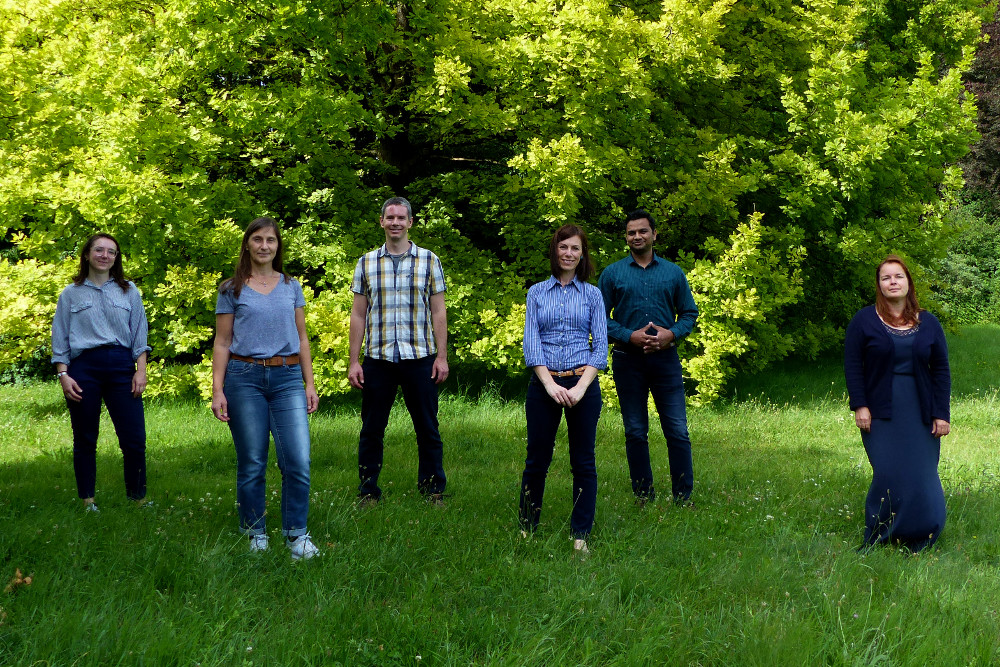Hoffnungsbaum e.V. finances MPAN project at Helmholtz Zentrum München
Hoffnungsbaum e.V. awards funding in the amount of € 151,540 to Dr. Arcangela Iuso and her team from the Institute of Neurogenomics at the Helmholtz Center in Munich. The funding will finance a 27-month research project to uncover key disease mechanisms in MPAN (mitochondrial membrane protein-associated neurodegeneration). Project leader Dr. Arcangela Iuso, an experienced MPAN researcher, and her team are investigating the role of the protein controlled by the C19orf12 gene in the lipid metabolism of cells.
MPAN is one of the four most common subtypes in the group of diseases summarized as neurodegeneration with brain iron accumulation (NBIA). This form of NBIA leads to progressive movement disorders and often to neuropsychiatric symptoms and impaired vision. MPAN predominantly begins in later childhood and inevitably leads to severe disabilities. There is still no therapy that could delay or stop this progression.
Mutations in the C19orf12 gene cause MPAN. They lead to an impairment of the corresponding protein function. Unfortunately, the exact function of this protein has not yet been deciphered. This is precisely where Dr. Iuso and her team are now starting. In their research project, they are investigating the hypothesis that the C19orf12 protein regulates both the lipid balance in the cell and the exchange of molecules between the intracellular organelles. If these cellular processes are disrupted, this can lead to an abnormal accumulation of metabolic products such as lipids or iron.

From left to right: PhD student Enrica Zanuttigh, cooperation partners Drs. Lucia Berti, Ben Engel, Sophie Ayciriex (not pictured), project leader Dr. Arcangela Iuso, junior scientist Dr. Tilak Kumar Gupta, and technical assistant Annett Hering are working together to investigate the role of C19orf12 in the lipid metabolism of cells.
"With the proposed project, we want to investigate the function of the C19orf12 protein as a potential link between membranes within the cell and fully elucidate the effects of mutations in the C19orf12 gene on cellular processes that are mainly related to lipid metabolism," Iuso explains her project.
It would be an important milestone for MPAN and NBIA research to finally decipher the cellular function of the C19orf12 protein. As there are overlaps in the underlying molecular mechanisms of many NBIA diseases, this project could also provide insights into other forms of NBIA.
Iuso and her team will work with Dr. Benjamin Engel's laboratory on the Helmholtz Pioneer Campus to use a cutting-edge technology, cryo-electron tomography. This technique produces three-dimensional images of cells with fine molecular details. By directly imaging proteins that are in action in the natural cellular environment, cryo-electron tomography provides molecular insights into cellular processes and thus also into disease mechanisms. The groups of Iuso and Engel will image cells from MPAN patients.
Other cooperation partners in the project are Dr. Sophie Ayciriex from the Institute of Analytical Sciences at the University of Lyon and Dr. Lucia Berti from the Institute for Diabetes Research and Metabolic Diseases at the Helmholtz Zentrum München at the University of Tübingen.
"If we succeed in elucidating the function of C19orf12 in the context of lipid metabolism," says Iuso, "this will hopefully pave the way for the development of an effective treatment for MPAN based on the disease mechanisms."
The financing of this research project was made possible by numerous fundraising campaigns and individual donations. Thanks to the private initiative of a family whose daughter was diagnosed with MPAN in 2018 and their many supporters, particularly in Saarland, an important research project has been launched to shed light on the mechanisms of the disease and pave the way for therapies. On behalf of Maya and all children, adolescents and adults affected by MPAN around the world, we would like to take this opportunity to thank all our supporters once again for their overwhelming willingness to donate. The fundraising campaign will continue for the benefit of other MPAN projects: Help Maya

The Helmholtz Center Munich is a research center with the mission of developing personalized medical solutions for the prevention and treatment of environmental diseases for a healthier society in a rapidly changing world. The center is headquartered in Neuherberg in the north of Munich. Helmholtz Zentrum München employs around 2,500 people and is a member of the Helmholtz Association, the largest scientific organization in Germany with more than 40,000 employees in 19 research centers.
On Institute for Neurogenomics (ING) focuses on the genetic basis of neurological diseases. Research focuses on the underlying genomic architecture and the molecular mechanisms of complex genetic and rare neurological diseases. The aim is to research the genetic basis of neurological diseases in order to improve their diagnosis and to be able to offer patients a customized individual therapy in the long term.
